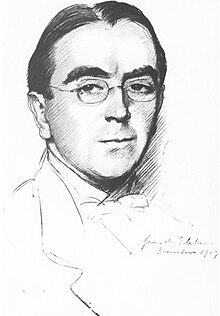John Ireland (composer)
| John Ireland | |
|---|---|

John Ireland in 1917, by Jane Emmet de Glehn
|
|
| Born |
13 August 1879 Bowdon, Cheshire, UK |
| Died | 12 June 1962 (aged 82) Rock Mill, Washington, Sussex, UK |
| Occupation | Composer and teacher |
John Nicholson Ireland (13 August 1879 – 12 June 1962) was an English composer and teacher of classical music. The majority of his output consists of piano miniatures and of songs with piano. His best-known works include the hymn "The Holy Boy" and a setting of the poem "Sea Fever" by John Masefield.
John Ireland was born in Bowdon, near Altrincham, Cheshire, into a family of Scottish descent and some cultural distinction. His father, Alexander Ireland, a publisher and newspaper proprietor, was aged 70 at John's birth. John was the youngest of the five children from Alexander's second marriage (his first wife had died). His mother, Annie (née Nicholson), was 30 years younger than Alexander. She died in October 1893, when John was 14, and Alexander died the following year, when John was 15. John Ireland was described as "a self-critical, introspective man, haunted by memories of a sad childhood".
Ireland entered the Royal College of Music in 1893, studying piano with Frederic Cliffe, and organ, his second study, under Walter Parratt. From 1897 he studied composition under Charles Villiers Stanford. In 1896 Ireland was appointed sub-organist at Holy Trinity, Sloane Street, London SW1, and later, from 1904 until 1926, was organist and choirmaster at St Luke's Church, Chelsea.
Ireland began to make his name in the early 1900s as a composer of songs and chamber music. His Violin Sonata No. 1 of 1909 won first prize in an international competition organised by the well-known patron of chamber music W. W. Cobbett. Even more successful was his Violin Sonata No. 2: completed in January 1917, he submitted this to a competition organised to assist musicians in wartime. The jury included the violinist Albert Sammons and the pianist William Murdoch, who together gave the work its first performance at Aeolian Hall in New Bond Street on 6 March that year. As Ireland recalled, "It was probably the first and only occasion when a British composer was lifted from relative obscurity in a single night by a work cast in a chamber-music medium." The work was enthusiastically reviewed, and the publisher Winthrop Rogers offered immediate publication (the first edition was sold out even before it had been processed by the printers). A subsequent performance of the Violin Sonata by Ireland and the violinist Désiré Defauw drew a packed audience to the Wigmore Hall in London.
...
Wikipedia
